Weed Spotter newsletter issue 22 — Autumn 2018
Open gardens are worth a look for Weed Spotters
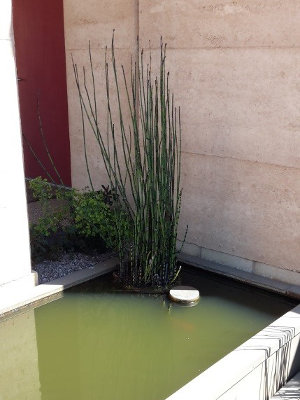
In November 2017, a member of the public attending an open garden near Ballarat, reported seeing horsetails growing at the property.
The horsetails were growing in pots in a pond. Agriculture Victoria officers visited the property shortly after the report was received to remove the plants, interview the land owner, and conduct tracing investigations.
Tracing involves investigating where the plants originally came from and whether they have been passed onto anyone else to find other sites that will require treatment.
This horsetails find demonstrates the value of having people with good botanical knowledge, such as Weed Spotters, keeping a look out for State prohibited weeds at all times.
Open gardens provide a unique opportunity to visit private gardens that that are listed with an open garden scheme. Not only are visits to open gardens enjoyable and interesting, but there is potentially the opportunity to spot a State prohibited weed that would have otherwise remained undetected.
State prohibited weeds in gardens can easily spread into agricultural and environmental areas by seed dispersal, root growth and disposal of garden waste.
Of course, it's important to always be discreet. If you think you have found a State prohibited weed in someone's garden email weed.spotters@agriculture.vic.gov.au or call the Customer Service Centre on 136 186.
Please don't approach or contact the land owner about the plant yourself. Agriculture Victoria will follow up on your report and contact with the landowner to arrange safe and effective treatment and removal.
Alligator weed eradication – collaboration and co-operation are keys to success
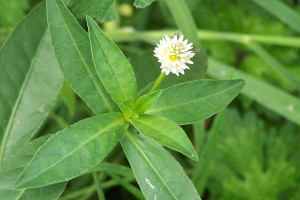
A recent collaboration between Agriculture Victoria and Melbourne Water has helped prevent the spread of alligator weed into central Melbourne.
Melbourne Water has shared mapping data for drainage infrastructure including above and below ground pipes, guttering and drains. This means that Agriculture Victoria now has access to information to allow for the tracing of potential alligator weed dispersal, which readily spreads over long distances in water.
In Westmeadows in 2017, a new alligator weed infestation was found in a newly built housing estate. The infestation was growing in a front yard, where it was susceptible to dispersal from mowing and landscaping activities. It was also close to roadside gutter drains which could facilitate long distance dispersal.
Melbourne Water provided maps to Agriculture Victoria, showing the underground pipe which drains from these grates to a creek, 300 metres away. Whilst undertaking delimitation surveillance of this area in February 2018, Agriculture Victoria staff discovered a juvenile but thriving alligator weed plant had established two metres from the outflow end of the drain. Further surveying was undertaken downstream, upstream and around the pipe outflow, however no further infestations were found.
If Agriculture Victoria had not been provided the drainage maps by Melbourne Water, we may not have found this infestation, allowing alligator weed fragments to spread along the creek and create new infestations downstream. If allowed enough time, the infestation could have spread along 20km of waterway to the Yarra River adjacent to the Bolte Bridge at Docklands.
The infestation was treated a few days later by contractors, who also removed loose stems that could have spread downstream. Ongoing monitoring will now be undertaken to ensure we have prevented an extensive and difficult to control infestation from establishing in the creek.
Read more alligator weed.
If you see alligator weed email weed.spotters@agriculture.vic.gov.au or call the Customer Service Centre on 136 186.
State prohibited weeds are welcomed to their new home
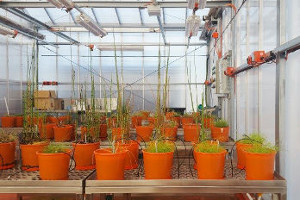
As a critical part of Agriculture Victoria's State prohibited weed program, Agriculture Victoria maintain a collection of State prohibited weeds, including Mexican feather grass (Nassella tenuissima) and salvinia (Salvinia molesta).
This requires a highly secure specialist facility to maintain the unique collection of plants, so the Attwood Invasive Species Facility was built.
The new facility meets Agriculture Victoria's need for a controlled climate to house high risk invasive plants and was designed to high biosecurity quarantine standards, replacing Agriculture Victoria's aging glasshouse in Frankston.
In each of the 5 glasshouse rooms, the High Risk Invasive Plants team can specifically program the climate to suit the species housed there. For example hot and dry conditions can be created for Mexican feather grass and cool and wet conditions for horsetails (Equisetum spp). The fully automated system controls light-levels (via retractable shading), temperature, humidity, and irrigation.
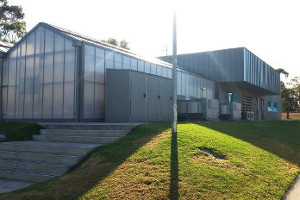
Due to the high risk of the species housed in the glasshouse, the facility has biosecurity features to prevent the species escaping from the facility and spreading.
This includes a fine mesh over the vents, air conditioning intakes and drains, double doors with an airlock, and a closed sewer system, to prevent any seed from escaping.
The glasshouse allows Agriculture Victoria to maintain a State prohibited weed collection used to train Weed Spotters and biosecurity officers to identify State prohibited weeds, using real-life specimens.
These specimens are especially valuable as these species are very rare in Victoria. For some species, such as salvinia and karoo thorn, we have the only known plants in Victoria.
The glasshouse's climate controls and growth cabinets are also particularly useful when we need to stimulate growth in juvenile plants to identify the species. This can be useful for suspected Mexican feather grass plants, which until they mature and flower, are particularly difficult to identify.
The facility highlights Agriculture Victoria's ongoing dedication to biosecurity and is an essential component of our State prohibited weed program.
Bring on the adventure, not the weeds
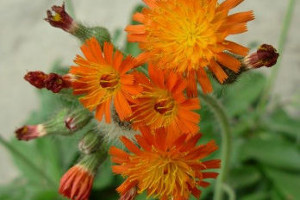
In December 2017 a new patch of orange hawkweed was discovered on a mountain bike track near Falls Creek. There were plants on both sides of the track, many with flowers and spent seed heads, indicating that seed was potentially present on the track itself.
Seed present on the track can easily be picked up in mud that sticks to bikes and people as they pass through a contaminated area. The find was particularly concerning as it is on one of Australia's busiest mountain bike trails and was found in the lead up to the busiest time of year.
Well used tracks present a higher risk of spread than other areas due to the high number of users coming into direct contact with the soil.
Falls Creek Resort Management and Parks Victoria staff worked quickly to treat the site and prevent mountain bikes coming into contact with contaminated soil by covering the section of the track adjacent to the infestation with rubber matting.
They monitored the entire network of mountain bike trails at Falls Creek throughout the hawkweed growing season (to the end of March) to ensure a fast, effective response in the event of further outbreaks.
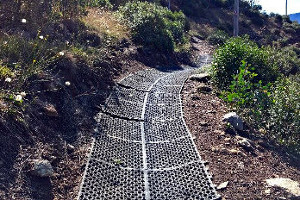
Everyone who comes to Falls Creek and the Alpine National Park is urged to help us protect Australia's world-class natural areas by following simple hygiene practices to stop further spread of hawkweed and other pathogens.
Whether you're riding a bike or a horse, camping or just walking you can help by making sure all your clothing and equipment is spotless every time you come to Falls Creek and cleaning and drying it all after every ride or walk.
You can also use the free bike wash in the Slalom North Car Park in Falls Creek Village.